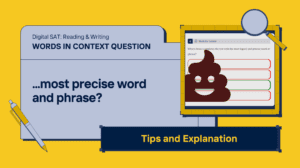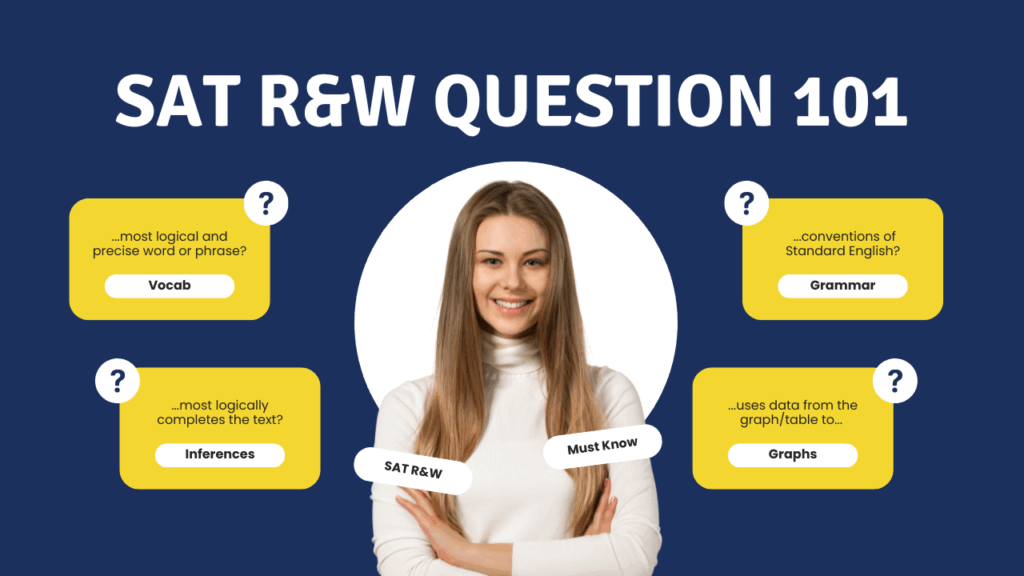Typical of the Reading and Writing sections of the Digital SAT, there are several distinct categories and types of questions based on the skill being tested. Here is a comprehensive list:
1. Words in Context
These questions test vocabulary and the ability to choose the most appropriate word or phrase based on the surrounding text.
- “Which choice completes the text with the most logical and precise word or phrase?”
- “As used in the text, what does the word ‘…’ most nearly mean?”
2. Standard English Conventions
These questions test grammar, usage, punctuation, and sentence structure. The goal is to make the text conform to the rules of formal written English.
- “Which choice completes the text so that it conforms to the conventions of Standard English?”
3. Transitions
These questions focus on the logical flow between ideas, sentences, and paragraphs.
- “Which choice completes the text with the most logical transition?”
4. Idea, Structure, and Purpose
These questions test understanding of a text’s purpose, main idea, structure, and specific details.
- Main Idea/Purpose:
- “Which choice best states the main purpose of the text?”
- “Which choice best states the main idea of the text?”
- Function/Structure:
- “Which choice best describes the function of the underlined sentence/portion in the text as a whole?”
- “Which best describes the overall structure of the text?”
- Details:
- “According to the text, what is true…?”
- “The text makes which point about…?”
- Paired Passages:
- “Based on the texts, how would the author of Text 2 most likely respond to… Text 1?”
- “Based on the texts, both authors would most likely agree with which statement about…?”
5. Logical Conclusion
These questions require you to complete a passage in a logical way. This is what most students find tricky. It’s more about comparing information and making sure the passage stays focused.
- “Which choice most logically completes the text?”
6. Evidence (Graphs, Tables, and Quotes)
These questions test your ability to interpret data from graphs and tables or to find the best textual evidence to support a claim.
- Data from Graphs/Tables:
- “Which choice most effectively uses data from the graph/table to complete the example/assertion/statement?”
- “Which choice best describes data in the table/graph that support the… claim?”
- Textual Evidence:
- Literature: “Which quotation from […] most effectively illustrates the claim?”
- Science and Social Study: “Which finding, if true, would most directly support/weaken/challenge the hypothesis/claim?”
7. Rhetorical Synthesis (Notes-Based Questions)
These questions provide a set of notes and a specific rhetorical goal (e.g., to emphasize, compare, contrast, introduce a topic). The task is to choose the sentence that best achieves that goal using the information provided.
- “The student wants to [emphasize, compare, contrast, specify, explain, etc.]. Which choice most effectively uses relevant information from the notes to accomplish this goal?”
Extensive Reading
We have dedicated videos on our YouTube Channel that explain in detail how to crack different types of questions on the SAT. Or watch the sample lesson in our SAT English Online Course to get an overview of the strategies for all types of questions.

What’s Next?
Having the knowledge of different types of questions in the SAT Reading and Writing section can help you in certain ways:
- Navigate to different types of questions more easily: You can easily do the questions in the order that makes most sense to you.
- Focused practice: When you know which type of question you get wrong often, you can focus on the skills relevant to them. This is crucial when you study with a course, a textbook, or a tutor. Knowing what to focus on helps you narrow down your focus and saves your time and energy a lot.
Did you know we have FREE SAT English questions and weakness analysis?
In fact, this very question is from our Free SAT Reading & Writing Quiz. Analyze your skills in Reading & Writing, and discover your study focus. Complete the free questions and receive a full report of your strengths and weaknesses.
#satengtips #digitalsat #sat #dsat #satprep #sattips #sathacks #satstrategies #satenglish #satreading

